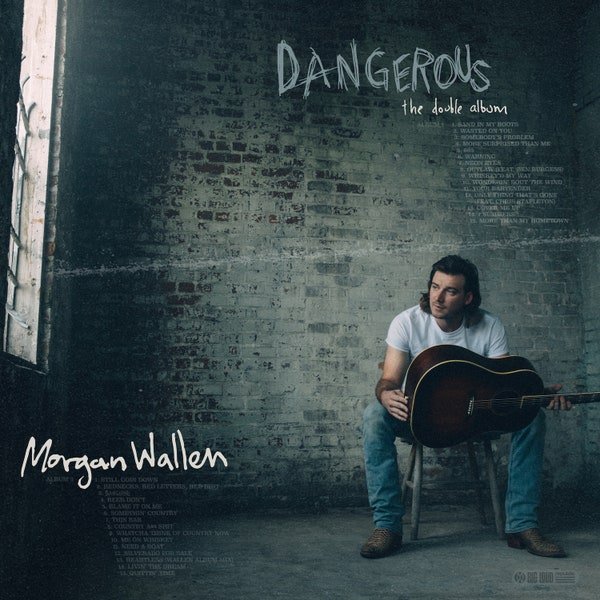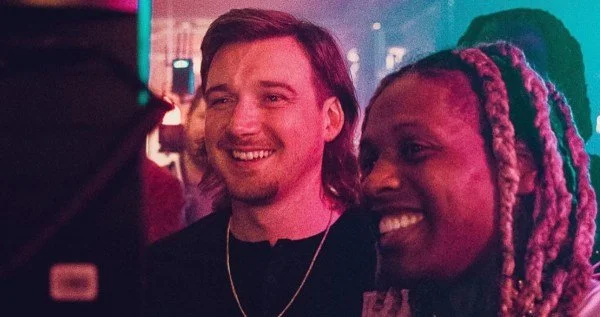Notes On Morgan Wallen's Redemption Arc, The "Black-Backed" Apology & Lil Durk
Around this time last year, I started working on an essay that I was very excited about. The subject of the essay, Morgan Wallen, felt like the vertex of the convergence of several different trends in music and culture. With hip-hop holding steady as the most-consumed genre in the United States along with the world's incessant need to center straight white maleness whilst stealing from Black culture, Morgan Wallen was a natural inflection point.
An eliminated contestant from Season 6 of The Voice, Morgan would soon find himself positioned as country's next big crossover star. In a sense, he seemed to be the genre's answer to the sour 2018 Lil Nas X controversy. I don't mean crossover in the sense of "one song gains a lot of traction at Top 40 and then the masses move on." I mean crossover in the sense of Taylor Swift. Yeah, that big. By taking cues from the lengthy tracklists that have dominated pop and hip-hop in the streaming era and borrowing gluttonously from trap production motifs, rap cadences, and R&B-inflected melodies, Morgan looked to dominate 2021 from the top of the year to the very end.
The original essay underwent numerous evolutions and it eventually became an analysis of the significance of the massive chart success of Morgan's new album Dangerous: The Double Album. Soon after I published that piece, Morgan flushed (kind of, more on that later) all of that potential down a toilet drain of raucous public inebriation and the hurling of the word so many non-Black people love to say whether or not they know they're being filmed. On February 2, 2021, TMZ published video footage of Morgan Wallen saying, "take care of this pussy-ass nigger," in reference to another guy in his group. Of course, the backlash was swift and direct. After all, Summer 2020 taught everyone that Black people are people and that racism is wrong! Right?
Big Loud / Republic
The weeks that followed the video's emergence were turbulent. Despite issuing an apology statement, the industry backlash Morgan faced felt a lot more serious than past music controversies. Major radio conglomerates like SiriusXM, iHeartRadio, Audacy, Cumulus, and Townsquare temporarily banned his music from being played. CMT and the Country Music Association removed Morgan's appearances on their platforms. Streaming platforms like Apple Music, Spotify (for a week, surprise surprise), and Pandora removed Morgan's songs from their official featured playlists. Various awards institutions deemed Dangerous and Morgan ineligible to compete or banned him from attending. The biggest shocker was Morgan's label, Big Loud, "indefinitely" suspending his recording contract. Of course, from the jump, the backlash smelled a bit funny. For all of their love of performance, Spotify couldn't even be bothered to stand in their decision for more than a week. Moreover, an indefinite suspension sends a very loud and very clear message: "Morgan Wallen makes us money and his use of racial slurs is not serious enough for us to sacrifice that bag." Unsurprisingly, the backlash meant nothing. Dangerous ended up becoming the first country album in history to spend its first seven weeks at #1 on the Billboard 200. In fact, Dangerous is the first album to spend at least its first ten weeks at #1 since Whitney Houston's Whitney in 1987.
It was an odd paradox. Morgan Wallen was supposed to be one of the biggest artists of the year with one of the biggest albums of the year. In a sense, this was exactly what happened and the opposite of what happened. Thanks to the fervent support of his country music base and legions of people who believed that Morgan should not have been "canceled" for his use of N-slur, Dangerous was able to achieve historic chart success without tasting even a fraction of the ubiquity that commercial success is supposed to come with. Dangerous reigned at #1 on Billboard's Year-End Albums Chart over albums like Justice (Justin Bieber), Planet Her (Doja Cat), and SOUR (Olivia Rodrigo) without having songs that achieved a sliver of the ubiquity and success of singles like "Peaches," "Kiss Me More," or "good 4 u." So, Morgan didn't really flush everything down the drain. There was a pile of shit in the toilet that blocked the drain. That shit was lip service from companies more interested in brand protection than anti-racism, white privilege, and an insatiable thirst for profit. Remember, Morgan was supposed to be country music's next major crossover star. He was, and still is, the establishment's answer to the tides of queer, Black, and woman country artists garnering dedicated fanbases and critical acclaim while challenging the norms and expectations of the genre. They weren't letting go of Morgan Wallen if they could help it. So, the usual happened. Morgan pulled away from the public eye and aggressive promotional campaigns for the album were rolled back. Then, slowly, he started to re-emerge.
All was quiet on the Morgan Wallen musical front for most of 2021. In August 2021, his music returned to the airwaves with "Sand In My Boots" serving as the final single from Dangerous. The Morgan Wallen Redemption Arc kept chugging along, and it culminated in one of the most sinister early Christmas gifts ever. In a surprise twist ending to the sick joke that was 2021, Lil Durk and Morgan Wallen dropped a collaboration titled "Broadway Girls." Released with no prior warning on December 17, the single debuted at #14 on the all-genre Hot 100, became the first #1 for both artists on the Hot R&B/Hip-Hop Songs chart, and currently sits in the Top 5 on Apple Music US.
Why, Durk? Why? As the artist with the most (41) Hot 100 entries of 2021 (he's tied with Taylor Swift, but none of his songs were re-recordings of old material that had previously appeared on the chart), it's not like you were hurting for commercial success or anything. "Broadway Girls" picks up right where "Wasted On You" and "Heartless" left off. The trap influences aren't just influences anymore. Morgan is singing over full-fledged rap production courtesy of Joe Reeves and Charlie Handsome. He employs a rap-sung cadence as he laments over unsavory past experiences with women on the Broadway strip in Nashville, Tennessee.
Here's the thing: we all knew Morgan Wallen was going to come back at full force, it's just a shame that it had to be in this particular way. Morgan Wallen used language that degrades and dehumanizes Black people despite operating in the lanes of two genres birthed from the brilliant minds of Black people. And who was first in line to assist him in the musical leg of his redemption arc? A Black man. When other people in the Black community call Black men (specifically, Black straight cisgender men) the weakest link... this is why. Any level of proximity to whiteness devours self-respect.
Alamo
Morgan initially previewed this track in October, and even though he's listed as a featured artist, he's on the song more than Durk is. The decision to have Durk as the collaborator on this song was very calculated. First, Durk guarantees streams. With Durk on a track, you've almost ensured an entry on the Hot 100. Second, the collaboration uses rap and Black people as crutches. The play here is that Morgan Wallen made so much progress towards anti-racism in the past eleven months that: 1) he's actually collaborating with rappers instead of relying on their innovations to boost his own music's crossover potential and 2) Black people are happy and willing to work with him. Moreover, the song borrows just enough from hip-hop to make white country listeners feel comfortable and cool, but it never veers far enough from respectability (it's Lil Durk's first non-explicit single) to lose that audience. With Durk as the listed primary artist people can feel less guilt about supporting the song because "it's not really a Morgan Wallen song." Except it very much is.
Lil Durk has allowed himself to be used as a prop for Morgan Wallen's public redemption. "Broadway Girls" provides an avenue for people to return to publicly supporting Morgan Wallen not because he's proved his progress on his own volition, but because his alleged progress has been co-signed by one of the biggest Black musical artists today. The kicker for me is that no one, at least as far as we know, forced Durk to do this song. He willingly allowed himself, and rap as a whole, to be proxies for Morgan Wallen's redemption. All for what? A check? The funny thing is, so many straight male rappers like Durk will sooner work with a "rehabilitated" racist like Morgan Wallen than work with queer rappers like Lil Nas X or Saucy Santana. They'd rather let their Blackness be used to relegitimize a person who gleefully indulged in anti-Black behavior.
Last September, Rolling Stone reported that just one of the dozens of Black-led or Black-founded charities they interviewed reported receiving any of the $500,000 Morgan claimed to be donating in his July interview with Good Morning America. He doesn't get to weasel his way back into the mainstream by shamelessly using Blackness as atonement points. In a perfect world, if you, as a grown non-Black man, have no issue spewing "nigger," you should have no issue with any of the retribution sent your way even if it's permanent. Your career is permanently sidelined and never recovers from the devastation? Too bad, pookie. Unfortunately, we live in a dreadfully imperfect world, so that's not happening. The powers-that-be want to reach the end of Morgan Wallen's redemption arc? Fine. So be it. Leave Black people out of it and don't rely on us to help officially clear the name of a man who perpetuated behavior that harms us.
To circle back to Durk for a minute, Black men... we're not off the hook here. Let's have a bit more couth, cognizance, and self-respect, no? And while I'm at it, we as consumers, participants, and shifters of the culture need to reassess the pedestals on which we place celebrities because, by and large, the practice is rendering any kind of criticism pointless. "Broadway Girls," no matter how catchy it is, should not have been embraced as warmly as it has been because of what it represents. I love Durk as much as the next person, but he should have been called out for this and his line of thought surrounding Morgan and his conversations should have been more closely interrogated. "He's not a racist, that's my boy"; "I vouch for him, and he's good"; "He ain't canceled, I talked to him. When I say you ain't canceled, you ain't canceled." Whether Durk realizes it or not, the language he's using embraces the fact that Morgan's redemption is contingent upon his position as torch-bearer for Black culture and Black music.
A mediocre country-trap duet and a co-sign from a hot rapper as the roadmap for Morgan Wallen's redemption arc do more to reinforce the behavior that got him in this position in the first place. Black people and Black music are not rolls of duct tape or cans of WD-40 to be used to fix white people's issues whenever it's convenient for them to do so. Take that elsewhere.



